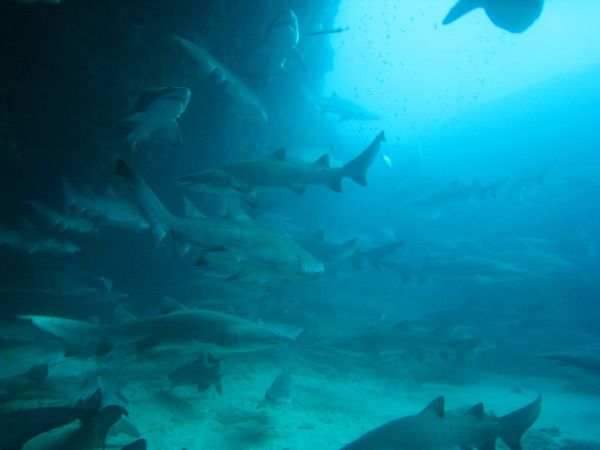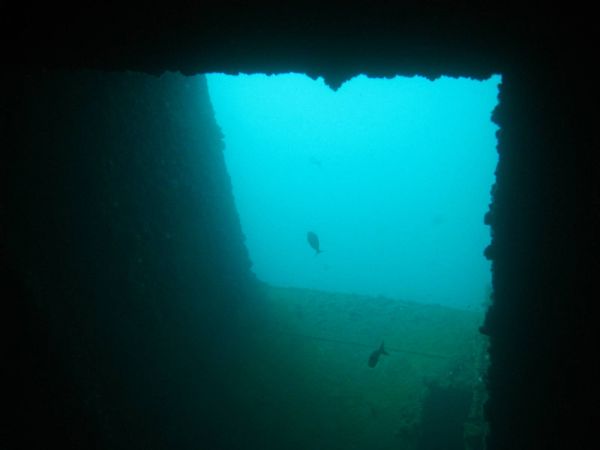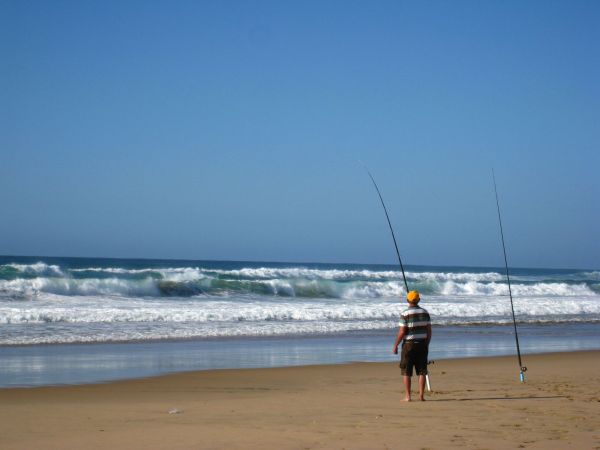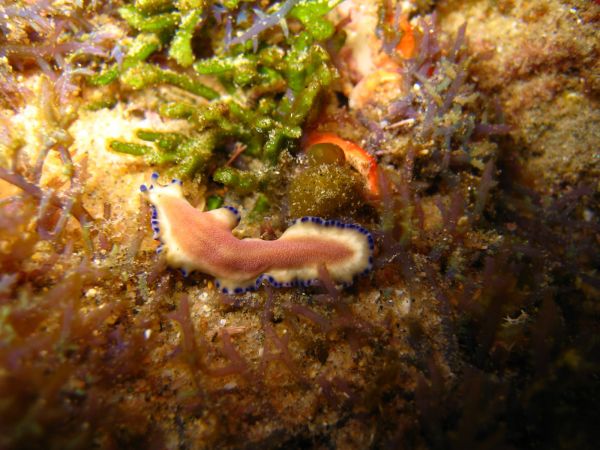The oppressive atmosphere of « Jaws » floats overhead. The outing of the day takes us to the discovery of the great white sharks. In spite of the ultra-touristy side and the sensation to be squeezed in a cage to make the excursion profitable at most, the meeting with a great white shark remains unique and crystallizes a pleiad of feelings: from the nervousness to the fright, from the awe to the admiration. Powerful jaws, several raws of triangle-shaped teeth, a highly-developed sense of smell to pinpoint some micro-drops of blood within several cubic meters of water. Although it's a terrible predator, the danger it represents for man was stigmatized in a really too deep way. The danger indeed exists, but the number of deaths due to the attack of great white sharks doesn't outnumber the 10 people each year – we are far from the hundreds of people which are electrocuted each year with a toaster that doesn't work well.
the trip is running smoothly. Briefing of the participants on the lawn of the center then we go by boat to the diving area. The crew bustles about rigging up the cage to the hull of the boat. Last safety instructions and the first batch of divers slip in the cage. The main instruction is simple not to say childishly logical: do not put the hands or the feet out of cage and this on no account. It smells tuna at the back of the boat... A member of the crew jettisons a head of a fish hooked on a rope and the first creature arrives – the “Jaws” soundtrack carries on its disjointed melody as a musical background. A peaceful and massive swimming before leaping out of the water to seize the bait. A ligthning attack. The half-open mouth lets sparkle its perfect dentition. The divers are in an ideal position. I fidget on the deck. That's my turn. I slip on the weight belt and get in the cage. Insistent music still goes through my mind. From a small corner of the cage I am, the instant is grandiose. Several sharks swim in front of us and prowl around the bait. Another one attacks the foam-rubber protection of the cage.
Each diver will go two times in the cage before the boat makes a detour towards a colony of seals laying down on a small island. A favourite food for the great white sharks. We leave this place to go back to the pier and step again on our so- welcoming earth.

Keyword - submarine universe -
Tuesday 5 August 2008
With the great white sharks...
By dorian on Tuesday 5 August 2008, 21:51 - RTW2-South Africa
Tuesday 29 July 2008
surrounded by ragged-tooth sharks
By dorian on Tuesday 29 July 2008, 15:26 - RTW2-South Africa
We thought our submarines emotions were worn-out, that we experienced everything during our Sodwana Bay stay, a few days before. We believed it was necessary to have a change of air before dipping again the head into the water. Live a little bit with the memories and marvel at new horizons, leave the blue of the ocean for the rock of the mountain or the ochre of the savannah. We were wrong.
that takes place at Umkomass. Off this submarine-activities-oriented village, the Aliwal shoal reef. First appointment at « cathedral », a grotto whose roof collapsed and opened a natural light shaft. An azure cone which lights the most beautiful submarine sequence I've seen so far. The knees on the sandy bottom, the elbows leant on a rock. 25m deep, time isn't important any longer so much the instant is unfathomable. Shadows swirl around a marine-hued watercolour. Familiar silhouettes, so appalling and so appealing. The danger suddenly becomes insignificant. Some shapes approach, exposing their predator eyes and ill-fitted teeth.
meeting with a ragged-tooth shark.
its partners carry on wheeling, twirling. 50, 80 or 100, the figure doesn't much matter. The noise of my regulator interrupts the world of the silence and the stealth glide of these sumptuous creatures. I I soar, nitrogen- and drug-addicted, intoxicated by this fleeting heaven. However, we must take off this stone and slowly go up along the reef. My eyes don't want to look away any more. The spirit still drifts in front of the cave to continue the dream. In a continuous loop, I play again the short video stolen from the aquatic world and I plunge back into the picture of « cathedral ». I shiver again... I feel like going back so much...







We put the head into the water again for a less-fierce and more-colourful dive. The spirit still clung to the inhabitants of « cathedral ».


















To cease associating the South-African East coast with the coral reef, we dive on the Produce wreck. Crumpled metal and concretion-covered pipes define the outlines of this old ship that is lying down, 30 meters deep. A great wreck where the natives are called Brindle bass, a grouper which can weigh 400+ kilos. In the dark corners of the superstructures, we observe some motionless specimens. We go a little bit too near and the imposing mass gets moving. Close harmony with the wonderful environment of Aliwal Shoal. And for those who haven't been tempted or convinced by the submarine universe, a last series of snapshots which match these words.








Saturday 26 July 2008
on the earth and into the water at St Lucia
By dorian on Saturday 26 July 2008, 08:19 - RTW2-South Africa
How to reconcile the visual hunt of terrestrial sometimes antediluvian-looking animals with the urge of putting on a mask and a snorkel to spy on the submarine critters and all of that within the same day? South Africa possesses the answer and haven't finished to surprise us on its diversity.
We arrive in the village of St Lucia where we land up in a great guest house called Blou house backpacker. At the bottom of the garden, mongooses argue over the passion fruits the vervet monkeys have wasted.
St Lucia and the eponymous lake draw a large estuary – the largest one in Africa – propitious for wildlife. Birds and mammals live in this park, encircling the lake. The savannah vanished and trees grew up. In spite of the change of habitat, a variety of animals succeeded in adapting. Rhinoceros, kudus, leopards, zebras and wildebeests took up residence in this luxuriant land. The avowed goal of the park's managers is to recreate the former waves of animals migrations when wildebeests and the others ran away the Lebombo mountains to move towards the wetland of St Lucia.
Before getting in the park, at the end of the estuary, the owner of the guest house has promised us hippopotamuses. Better to trust local people than the paper guides, he wasn't wrong.





following this starter, we dash off to cape Vidal, 35km from the village. The owner, him again, announced this thing to us: « on the way to cape Vidal, you'll see every kind of animals including rhinos, as soon as you arrive at the end of the road, you slip mask and snorkel on to see colourful reef fish before driving back to St Lucia ». His speech sounded like the tempting caption of a tourist brochure. And yet, he was right again.
Underwater:










and a few hours later, on the earth:




St Lucia, one of the good finds of our South African journey.
« previous entries - page 5 of 7 - next entries »

















 visits
visits